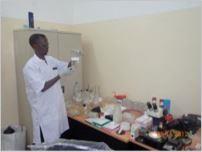 Situation analysis of insecticide susceptibility in all capital districts in DjiboutiStrengthening of national vector control capabilities in the Middle East and North Africa
Situation analysis of insecticide susceptibility in all capital districts in DjiboutiStrengthening of national vector control capabilities in the Middle East and North Africa
Policy
- Seven countries have an IVM policy framework with support provided by Global Environment Facility (GEF) and its additional resource mobilization from other donors
- Seven countries have a national policy on pesticide management that has an impact on insecticide resistance management
- WHO framework action developed on sound management of public health pesticides in the Region.
Institutional arrangements
- IVM steering committee constituted to review policies and regulations related to IVM
- Four countries have a restructured vector control unit including Egypt, Jordan, Morocco and Sudan.
Organization and management
- Clear standards for professions and careers in vector control and public health entomology have been established for approximately 6000 personnel
- Introduction of an epidemiological surveillance system on vector-borne diseases in seven countries
- Strategic direction provided through operational research in all participating countries
- Participating countries have overall 144 sentinel sites with functioning vector surveillance and insecticide resistance monitoring.
Planning and implementation
- Harmonization of separate vector-borne diseases control programme in seven countries through a national strategic and implementation plan.
Advocacy, communication and social mobilization
- Community ownership has been pivotal in sustaining gains of project activities, which was achieved mainly through partnership for change among all relevant stakeholders through advocacy meetings, multiple behavioural change campaigns and countrywide communications.
Capacity-building
The key focus area of GEF was development of human and infrastructural capacity to benefit the participating countries beyond the duration of the project. Some of the highlights are:
- Organization of certified training on IVM and judicious use of pesticides in seven countries, 745 staff have been trained in IVM
- Development of a robust curriculum by WHO Regional Office for the Eastern Mediterranean for a master of science degree programme in medical entomology and vector control with the Blue Nile River Institute, Geziera state, Sudan in 2008
- Development of guidelines and training materials for vector control professionals in the Region
- Regional consultation organized by the regional office on insecticide resistance in Casablanca, Morocco, with the participation of representatives from 12 ministries of health of the Region
- Organization of insecticide resistance monitoring training course in Cairo, in collaboration with the Naval Medical Research Unit 3 (NAMRU–3).
Related links
Integrated vector management (IVM) directory of resources


